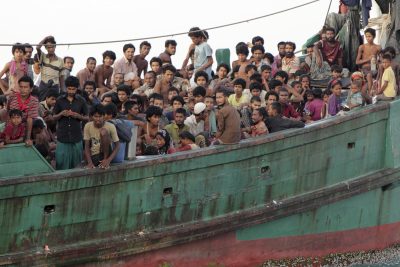
The issue of Bangladeshi ‘boat people’ has recently come to light following a series of high-profile crackdowns on human trafficking in Southeast Asia.
There are several reasons why Bangladeshis who do not meet the criteria to be considered a refugee under the 1951 Refugee Convention might partake in irregular and/or illegal migration via boat. Rising inequality and climate change are crucial push factors behind Bangladeshis taking boats to cross the Bay of Bengal and the Andaman Sea in order make a better living in Malaysia, Indonesia and even Australia. There are local reasons too. Findings from initial research identified the involvement of corrupt smugglers and traffickers as a facilitator of boat migration in Bangladesh.
According to an estimate by the Bangladeshi NGO BRAC, ‘as of 2014 more than nine million Bangladeshi migrant workers work abroad’. The major destinations for these workers are Muslim countries of the Middle East. Another study found that between 1976 and 2009, about 80.56 per cent of the total migrant workers went to Middle Eastern countries, such as Saudi Arabia (38.17 per cent), the UAE (23.55 per cent), Kuwait (7.11 per cent) Oman (5.35 per cent), Bahrain (2.84 per cent), Libya (1.23 per cent) and Qatar (2.31 per cent). These countries used to be frequented by a few highly skilled Bangladeshi migrants such as doctors, academics and engineers alongside a large number of unskilled low-paid workers.
What is missing from this discussion is insight into how the evolving politics of the Middle East and East Asia has contributed to Bangladeshis trying to migrate via boat.
Historically, migration has been considered a positive social phenomenon in Bangladesh as remittances sent back by Bangladeshis working abroad generally make a healthy contribution to the country’s foreign exchange reserve, economic growth and development.
The legacy of sending Bangladeshi workers to wealthy Muslim countries in the Middle East and East Asia began under the regime of late president Ziaur Rahman. Rahman emphasised ‘Islamic solidarity’ in Bangladesh’s foreign policy as codified in Article 25(2) of the constitution. At the same time, he shifted Bangladesh’s national identity away from the secular-socialist model asserted by his predecessors, and brought the country into the capitalist stream.
In response to Bangladesh’s official denouncement of secularism and socialism, and in order to uphold the ethos of Muslim brotherhood, wealthier Muslim countries began to import labour power from the ‘Islamic’ Bangladesh. Since Zia’s regime (from the early 80s), every government has pursued this same policy.
But migration to the Middle East for Bangladeshis has become difficult due to changes in immigration policies in some of these countries, alongside the War on Terror, and the rise of terrorist outfits such as Islamic State. For example, Bangladesh’s outwards migration to Libya, Syria, Kuwait and Lebanon faced predicaments recently due to wars and local political unrest. The biggest importer of Bangladeshi labour, Saudi Arabia, also imposed a seven year embargo upon Bangladeshi workers.
But the looming uncertainty about migration into these traditional labour markets has not deterred Bangladeshis from exploiting new avenues for seeking work abroad.
The continued state persecution of Muslim Rohingya communities in Bangladesh’s neighbour Myanmar has facilitated Bangladeshi migration, as hopeful migrants join boats full of fleeing Rohingya women, children and men. Local law enforcement agencies believe that unless persecution of Rohingyas in Myanmar is stopped, and unless there is effective policy coordination among states sharing the Bay of Bengal and Andaman Sea, it will be difficult for Bangladesh to stop its citizens from also crossing the sea on these boats.
About 40–60 per cent of an estimated 25,000 people who crossed the Bay of Bengal and Andaman seas in the first quarter of 2015 by boat with the hope of making a better life in Thailand and Malaysia were Bangladeshis. The rest were Rohingyas from Myanmar.
This problem of ‘boat people’ has invoked intense debate across wealthy countries including Australia, Malaysia, Thailand and in Europe. Even though the contribution of Bangladeshis to the global total of ‘boat people’ is still low, it has become a problem for Bangladesh. Many Bangladeshis lose their lives or are held captive by people smugglers and traffickers in their attempts to cross seas via boats. This has dire implications on the families they leave behind. The Prime Minister of Bangladesh, Sheikh Hasina, believes these boat people are an embarrassment to the country.
As the Bangladesh case shows when international politics shuts or exhausts labour markets in one region of the world, ordinary people may discover new, risky routes for irregular migration. Attempts to seek asylum by groups fleeing state persecution, such as the Rohingyas, may facilitate this kind of irregular migration. Given the complexity of irregular migration, halting these boats will require a concerted, organised effort from countries across the region.
This article has been republished from eastasiaforum.org.